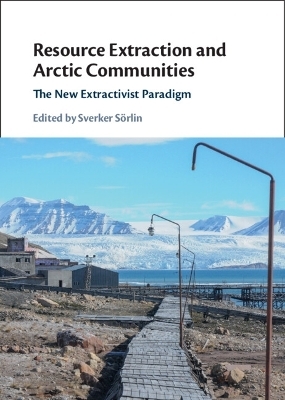
Resource Extraction and Arctic Communities
Cambridge University Press (Verlag)
978-1-009-10023-6 (ISBN)
For decades, a post-Cold War narrative heralded a 'new Arctic', with melting ice and snow and accessible resources that would build sustainable communities. Today, large parts of the Arctic are still trapped in the path dependencies of past resource extraction. At the same time, the impetus for green transitions and a 'new industrialism' spell opportunities to shift the development model and build new futures for Arctic residents and Indigenous peoples. This book examines the growing Arctic resource dilemma. It explores the 'new extractivist paradigm' that posits transitioning the region's long-standing role of delivering minerals, fossil energy, and marine resources to one providing rare earth elements, renewable power, wilderness tourism, and scientific knowledge about climate change. With chapters from a global, interdisciplinary team of researchers, new opportunities and their implications for Arctic communities and landscapes are discussed, alongside the pressures and uncertainties in a region under geopolitical and environmental stress.
Sverker Sörlin is a defining voice in environmental history and a prize-winning author of scholarly and non-fiction books on intellectual history and on the history and politics of climate change. He has a career-long interest in natural resource extraction politics and history, and chaired Sweden's national committee for the International Polar Year 2007-09.
1. The extractivist paradigm – Arctic resources and the planetary mine Sverker Sörlin; Part I. Extractivism: 2. Patterns of Arctic extractivism – past and present Sverker Sörlin, Brigt Dale, Arn Keeling, Joan Nymand Larsen; 3. Extraction cultures in Svalbard: From mining coal to mining knowledge and memories Thomas Hylland Eriksen, Zdenka Sokolíčkovál Part II. Impact: 4. Scenarios and surprises: When change is the only given Annika E. Nilsson, Simo Sarkki; 5. Cumulative effects on environment and people Carl Österlin, Hannu I. Heikkinen, Christian Fohringer, Élise Lépy, Gunhild Rosqvist; 6. How should impacts be assessed? Gunhild Rosqvist, Hannu I. Heikkinen, Leena Suopajärvi, Carl Österlin; Part III. Affect: 7. Affective approaches – rethinking emotions in resource extraction Lill Rastad Bjørst, Frank Sejersen, Kirsten Thisted; 8. Extraordinary underground: fear, fantasy and future extraction Vesa-Pekka Herva, Teresa Komu, Tina Paphitis; Part IV. Community: 9. Remediating mining landscapes Anne-Cathrine Flyen, Dag Avango, Sandra Fischer, Camilla Winqvist ; 10. Heritage for the future – narrating abandoned mining sites Dag Avango, Élise Lépy, Malin Brännström, Hannu I. Heikkinen, Teresa Komu, Albina Pashkevich, Carl Österlin; 11. Mining towns in transition – Arctic legacies Judit Malmgren, Dag Avango, Curt Persson, Annika E. Nilsson, Thierry Rodon; Part V. Code: 12. Beyond mining: Repair and reconciliation Marianne Elisabeth Lie; 13. Postscript – Extractivism after the 'New Arctic' Sverker Sörlin; Index.
| Erscheinungsdatum | 12.12.2022 |
|---|---|
| Zusatzinfo | Worked examples or Exercises |
| Verlagsort | Cambridge |
| Sprache | englisch |
| Maße | 176 x 251 mm |
| Gewicht | 700 g |
| Themenwelt | Recht / Steuern ► EU / Internationales Recht |
| Recht / Steuern ► Öffentliches Recht ► Umweltrecht | |
| Recht / Steuern ► Öffentliches Recht ► Völkerrecht | |
| Wirtschaft ► Volkswirtschaftslehre | |
| ISBN-10 | 1-009-10023-8 / 1009100238 |
| ISBN-13 | 978-1-009-10023-6 / 9781009100236 |
| Zustand | Neuware |
| Informationen gemäß Produktsicherheitsverordnung (GPSR) | |
| Haben Sie eine Frage zum Produkt? |
aus dem Bereich


